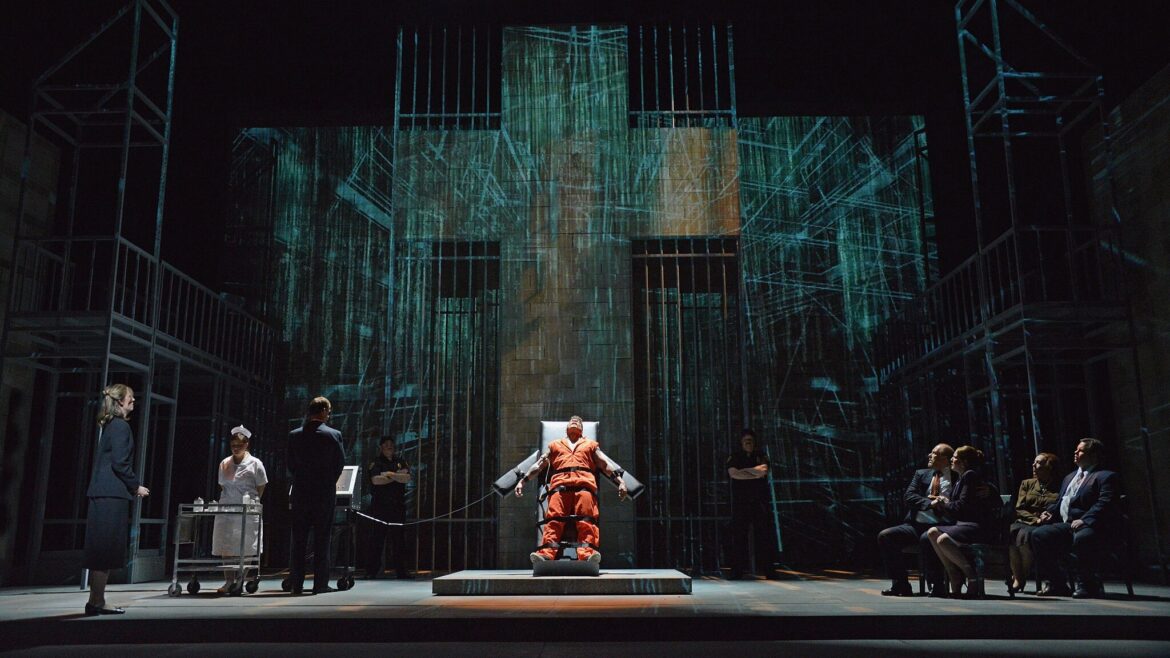Why a classical station should reconsider dropping The Met’s contemporary operas

Rockelev / CC BY-SA 4.0 via Wikimedia Commons
A 2016 Atlanta Opera production of "Dead Man Walking."
Update: After this commentary was published, WCPE announced on its website that it would broadcast the Metropolitan Opera’s entire 2023–24 season.
An open letter to Deborah S. Proctor:
I imagine it was a shock when the Aug. 31 letter you wrote to your listeners appeared on Twitter (now called X) and received nearly 125,000 views, along with a reported piece on NPR’s website. It’s a safe bet that the number of people who’ve heard about your refusal to broadcast six contemporary operas scheduled for the Metropolitan Opera this season outnumbers your weekly audience of approximately 180,000 listeners in central North Carolina. I’m not sure how long you’ve been the general manager of WCPE, but I can’t imagine a classical music station in Raleigh generally attracts the attention of national media outlets.
You told your members that WCPE “strive[s] to broadcast the classics which have earned the highest standing above all others, which are outstanding in their nature, quality, and eminence; and have stood the test of longstanding and widespread popularity, widely recognized as true classics.” This was part of your rationale for choosing to air operas like Carmen, Turandot, Madama Butterfly, Tannhauser and Un Ballo in Maschera while refusing to air works written within the past 100 years, like Dead Man Walking, The Hours and El Niño.
Deborah, I want to be honest with you. Reading your letter initially inspired a rage inside of me that was so intense I had to wait a couple of days before I sat down to write a response. I fully admit that my emotions were affected by my relationship to my grandfather, William Grant Still, the Dean of African-American Composers, who was told at one point to stop sending scores to the Metropolitan Opera because they would never perform his music.
To read a justification of your decision to broadcast performances of music by nine different white men of European descent while finding excuses to reject the works of every nonwhite artist on the Met’s season was personally galling. I had to let some time pass to let those emotions wash over and through me before I could see the issue in a more balanced way.
I now see that you may actually believe the justifications that you outlined in your letter to your listeners. After all, most discrimination is a product of unconscious bias. So let me address each of your errors in a systematic fashion.
- You air only “outstanding works” of high quality: If an opera is being performed at the Met, it has already passed this test. Even if you had doubts, the works you’ve rejected don’t fit the description of “low quality.” Fire Shut up in My Bones, based on a memoir that won a Lambda Literary Award that was also long-listed for the PEN Open Book award, won a Grammy and was composed by Terence Blanchard, who’s won five Grammys, two Oscars, a BAFTA, a Golden Globe and a Primetime Emmy.
- You air only works that have stood the test of time and popularity: Dead Man Walking has been produced 75 times since it premiered at the San Francisco Opera in 2000, making it the most widely performed opera of the past two decades.
- You don’t air operas that contain vulgar language: Excellent! You can put The Champion back on your schedule, because in order to comply with FCC guidelines, the Met told NPR that it “mutes curse words and questionable language within the radio broadcasts.”
- You don’t air works that contain adult themes: This is where things get tricky, Deborah. I’m afraid that you’ll have to cancel your Met broadcasts altogether, because the themes in the operas that you have deemed appropriate for families are far, far more “adult” than in the works you’ve rejected. For example:
- Carmen is about a soldier who is in sexual thrall to a Roma woman, abandons his post, helps her escape the authorities and then stabs her to death when she rejects him.
- Turandot is about a bloodthirsty princess who beheads the princes who try to woo her but fail to correctly answer three riddles. It begins with a beheading, in fact, and one opera company dropped a bowling ball into a wooden crate to simulate the sound of the falling head.
- Madama Butterfly is about a U.S. Navy officer who impregnates a 15-year-old Japanese girl, abandons her to return home, then returns years later to take her son away from her. She’s so distraught that she kills herself. So it’s great fun for the whole family.
- Tannhauser was a favorite of Freud’s. It was once described by The Guardian as having “one of the most extreme depictions of sex attempted in music.” A 2013 Nazi-themed production in Dusseldorf was canceled after several members of the opening-night audience had to seek medical attention.
- An opera has to be within the bounds of your musical format guidelines: I don’t even know what that means. You mention in your letter that an employee who “was very liberal” described the opera Florence e el Amazonas as “basically okay.” But this work by one of the most important Mexican composers of the 20th century has been performed all over the world to enthusiastic audiences. A review on Gramophone’s website described the music as “ravishing … richly tonal and melodically effusive, with soaring vocal lines; the orchestration dazzles.” So you’ll understand my confusion that you’ve decided, after a quick listen, to prevent the people of central North Carolina from hearing this piece for themselves. Ethically, it’s not the role of a general manager to censor what is heard on public airwaves based on nothing more than personal taste, but that’s what you’ve done here. If you can come up with no better reason for blocking the broadcast of Danial Catán’s outstanding opera than that you didn’t like it, I expect to see it on your schedule.
- The libretto of El Niño is based on a biblical story but uses non-biblical sources. I’m sure you’re aware that as leader of a 501(c)(3) nonprofit organization that gets funds from CPB, you cannot impose a religious test on the content you air.
Although you make no mention of it, I cannot end this note to you without mentioning the elephant in the room: racism. Not only have you elevated the works of white men while denigrating and censoring the art of nonwhites, but several of the pieces that you’ve labeled as “appropriate” are racist and sexist in the extreme.
Turandot, written by a man who never traveled to China, perpetuates many harmful Asian stereotypes, like the “Dragon Lady” trope. Writer Cat-Thao Nguyen wrote in 2022 that she was horrified when she went to a performance of the opera and “the horrible caricatures kept coming like a tidal assault. Ping, Pong, and Pang pranced around the stage with their Fu Manchu-style moustaches and fake long ponytails flicking across their costumes.” Nguyen and her husband walked out after the first act.
These “time-tested and great operas” that you tout in your letter are rife with misogyny, violence, racism and casual pedophilia. You say you are “happy to broadcast” them, but I suggest you think again. Just because they’re calling someone a whore in Italian doesn’t mean it’s any less offensive.
I hope I’ve clarified this for you and you can now understand why the reaction to your letter has been so widespread and so angry. You are in a position of public service, trusted to carry out your duties in an ethical and responsible manner without allowing your personal opinions to sway your decisions.
I suggest you rethink your ill-conceived decision to broadcast the racist, sexist, operas of nine dead European men while censoring the music of contemporary BIPOC composers. Familiar is not always good.
With respect,
Celeste Headlee






This is a fantastic rebuttal to anyone who thinks they are called by their god to sloppily censor or otherwise be the taste police.
Extra points for the author noting: If you wish to censor operas, be sure to not reveal that you do not understand what is in the operas. (Same goes for the book-banners who won’t read cover-to-cover but insist a book is unredeemable.)
Thank you for putting your thoughts down much more eloquently than I did in my letter to Deborah that I included with the biased survey she sent contributors.
Dear Celeste Headlee,
You certainly brought the issue to the point, that being simple personal censorship. Censoring perhaps in an effort to second guess the particular tastes of others. Don’t forget, the station doesn’t allow the NPR News program as well, so it doesn’t appear to be National or Public radio, certainly not allowing for expansion of ideas.
Great works of art have a universal, dare I say, worldly view, and so may be scary to those who live close to home in their imaginations. Many American composers have suffered from the prejudices you mention, and then some.
I’m a great admirer of your grandfather, Dr. Still’s music, his symphonies and operas. I dearly love the 3-act, Bayou Legend, and find the music as equally moving as Dvorak’s Rusalka. East Los Angeles College mounted a beautiful production in 1976 during the American Bicentennial. The applause was thunderous; what a shame no recording was made of that fabulous evening. It’s doubly sad that only three of his 7 operas are available, usually by college productions, or on underground recordings.
The Met in the past sadly overlooked three of America’s most important “tonal” composers: Wm. Grant Still, Douglas Moore, and Virgil Thomson. Each with melodious operas under their belts that would, I believe, have surprised and pleased much of the large Met Audience had they been allowed on stage. Let’s hope, as the Met reaches out to us this year, that it’s recent trend of producing American operas will grow in importance, in spite of a few fear-mongering deletants.
Both have valid points, but as a former concertmaster of a couple of opera companies, when we perform these modern works, they are very poorly attended. People just do not pay tickets for music that they do not perceive to be music. Imagine having a week from hell and then you have to sit down and listen to music which reminds you of the last hyper violent schizophrenic you had to work with in the hospital before they could give him a tranquilizer.
And musicians don’t like playing these works, either. It’s not very gratifying to play an opera which is only going to have one hearing and then when it’s done, everybody closes the book on it forever. I’ve known people who have burned the scores in their fireplaces after such a performance. One of the pieces sounded like World War III was exploding. It was so cacophonous nobody could make out the words, the decibel readings in the pit reached 137, and everybody was ready to walk off the job. During the performance, the composer came on stage just before we began: and he announced that the work was about his brother who died in Vietnam. Well, everybody could get on board but it was only one playing of the piece and it was never heard again. And this composer is currently very well known and I still wouldn’t play his music on my own volition.
So be angry if you want, but when the composers start composing things that have a melody again, or don’t sound like a rehashed version of psycho, you stand a chance that they might get a fan club which actually comes to the concerts again.
But then again, we played a competition concert for new composers and this one composer had the most complex and beautiful musical language. I had heard from any new composer. I was so eager that he should win because it would be a sign that we could have contemporary music which made sense and didn’t sound like it was always warring with self.
The piece that won, won only because it was a political move. The conductor wanted to pander to the Asian community by elevating this composer and bringing in Asian dollars to the fundraising scheme.
The real winner did not get his due. So we’re stuck with people who make decisions about these horrid pieces, and we have to play them. That Asian composition got laughed out of the house. It was bizarre and ridiculous at the same time. We actually renamed it because it was so offensive.
That cacophonous music is hard to sell and people don’t want to hear it. I know that I definitely don’t want to hear it; and I’m a musician. I don’t even want to be paid to play it.
So I can understand if they don’t want to play it. Pick some composers who can actually compose and you might stand a chance. I don’t need to hear primal scream therapy put to music….
Give El Nino a try. The readily available video gives a very good approximation of the live performance. It is highly tonal, with a stream of consciousness feel. The principal singers are all top notch.
Congratulations you have just joined the company of the mid 20th century Southern public television idiots who refused to air Sesame Street because of the multiracial cast of human adults and pre schoolers lived and worked together in a racially integrated Street. I hope you get the memo -that station was internationally humiliated when a local for profit station ran the show to earn a spectacular ratings uptick. There is nothing new or original in your diatribe about the operas you dismissed. We all know exactly what you’re twisting yourself into a pretzel to try to disguise in your post and believe me it is not an attractive look.
There’s no longer any need for “prior restraint” when organizations such as WUNC are so terrified that they censor themselves.
I’m pulling my monthly sustainer’s contribution.
Hi Paul, just wanted to point out that the station is WCPE, not WUNC.
There are many online choices for listeners to pick up Met broadcasts. WEKU Classical is one of them. We broadcast all Met performances offered and always will. Listen online at http://www.weku.org
I’d also ask if said station airs no “new music” by contemporary classical composers?